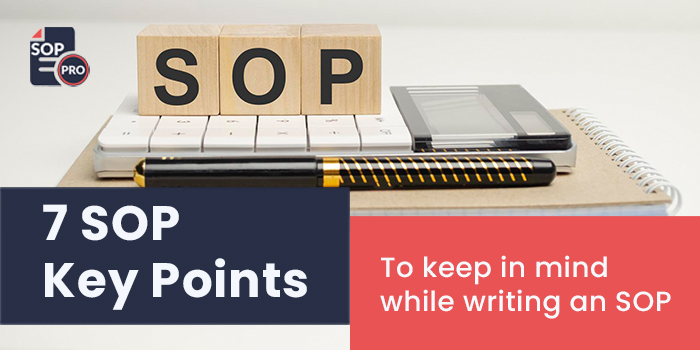Your SOP for a Masters course must be well-written if you want to get admission to a good university. Undoubtedly, many elements of a candidate’s application are examined before a choice of admission is made. While your academic records, exam scorecards/academic transcripts, and backlog certificates are all objective, your SOP is the only completely subjective element of your assessment. It really is the only single document in your application that allows you to demonstrate and showcase that you have something special that sets you apart from the other competition. As a result, the substance of your application file might have a significant impact on your acceptance. Each and every Statement of Purpose for Masters is unique. The intention behind drafting an SOP is to make it personal. Hence, no one can truly provide you with an honest blueprint for writing a fantastic SOP.
Our SOP Experts have come up with some actionable tips for Writing the Statement of Purpose which you one can keep in mind while preparing it. We have articulated all those ideas in this blog which you can read below:
One thing that all great books and dramas have in common is a memorable first sentence.
Similarly, the first paragraph of your SOP for Masters admissions should grab the reader’s attention. Before you write about the incident or a certain individual who inspired you to follow your subject, start with a quotation relevant to your aspiration and vision. It will definitely help you demonstrate that your discipline choice is not random but rather based on something more important.
Try to reinterpret the situation and become inspired about the idea of writing your statement of purpose.
You’ll only get a few chances to speak directly to the committee during the application process.
Take this as your chance to speak to them personally.
Each student brings a unique story to this exercise, which may include previous employment, volunteer work, or undergraduate courses. Consider what makes you unique and begin sketching it out.
Be true to yourself.
It’s helpful to think about the impact on the readers when writing your SOP for Master’s applications, but don’t forget to express yourself.
When drafting your statement, it’s critical to be genuine and just yourself in order to demonstrate to the admissions committee who you are and why your individualistic viewpoint would benefit the institution.
Make a checklist of your accomplishments.
Put together a list of your academic successes, co-curricular achievements, and experiences, as well as a list of your personal examples.
Making distinct lists will allow you to evaluate them objectively.
The lists might be extensive, containing information on your graduation, school, and even workshops and conferences.
There are plenty of examples of what you can take into account while drafting your M.S./MSc SOP.
The programs are rather extensive. Simply reflect and make a list of anything that comes to mind.
You also don’t have to be concerned about the timeline (Only include the most relevant extracurriculars and certificates. Do not worry about the exact time and year of your accomplishments initially. The final draft of your SOP will be strictly for that purpose, so just note down important events initially).
You are free to write anything in your SOP that comes to mind. No one can genuinely offer you a recipe for a fantastic SOP for Masters. A personal touch or a real-life anecdote is required to make the SOP stand out. No one can live the experiences you have lived. Use your life experiences to make your SOP as colorful and vibrant as you possibly can!
Examine, sort, and edit the information.
Sorting is, without a doubt, the most important phase. Remember that while defining your life’s goal is vital for your SOP, staying within the word limit is even more important.
The most critical “Don’ts” of SOP drafting is not exceeding the word limit.
As a result, it’s important to compare the lists at this point, classify the various points, and then trim the lists.
You must work hard to strike the correct balance between what you want to put in the SOP for Master’s applications and what you don’t want to include.
Make sure your SOP doesn’t come out as empty, ambiguous, blank, or irrelevant. Wherever feasible, include facts, reasoning, or instances.
Consider your objectives and goals carefully.
Can you guess one of the most significant distinctions between an SOP for an MBA and an SOP for a Masters program?
Well, one of the best answers to that question is that, while you would also discuss your professional and personal objectives in-depth in an MBA SOP, an SOP for your Masters’s does not have to specifically focus on professional positions or occupations.
It just might be the next step in your research goals, or it could be a continuing journey of understanding the topic.
It might also be a method of finding fulfilling work.
Whatever the situation may be, you must clearly identify what you want to achieve at this point and choose a subject for your SOP for Masters appropriately.
Your concluding lines should be catchy.
Your conclusion piece should have the same effect as your opening paragraph.
Discussing how you will act as a valuable resource and an asset to the institution and assist carry on the heritage via your activities is a terrific method to achieve this.
You can also convey your desire to attend the chosen university and how you plan to take advantage of the resources available.
Now that we have discussed the SOP in detail and how to outline your SOP for Master’s properly, we need to change our perspective a little bit and critically analyze ourselves. The following are a few psychological tools to help you get the most attention from the admissions committee.
Points to keep in mind while drafting Statement of Purpose for Masters?
Let’s understand further about the criteria we strongly believe admission officers use to evaluate the quality of your SOP for Masters now that we’ve figured out what a good SOP should look like.
Substance
It is a great reason to pay attention to because without a doubt the individuals reading your SOP are experts in their disciplines, it’s a good idea to talk enthusiastically about your study and specialized work in that sector, as it’ll undoubtedly impress them.
At the same time, you should try not to overburden your write-up with technical language; just use it when absolutely necessary. Importantly, your SOP for Masters cannot just be a repetition of your portfolio: the resume is informative and impersonal, but the SOP is more narrative.
For example, due to any circumstances in your life, if you have a low GPA, your SOP may still help you put your application in a new light. At the same time, your CV will just declare that you have a low score, whereas your SOP might demonstrate how, despite so and so circumstances, you have succeeded in other areas, highlighting and emphasizing that just a mark sheet is not THE END.
Free-flowing content
The changeovers and shifts between paragraphs should be interactive and effortless, allowing for a comfortable reading experience. This ensures consistency and comprehension of your SOP for Masters applications.
Also, there is no need to go into detail about what your study findings will involve in the future.
However, it is critical to show how your previous research has impacted your current work and how it will broaden your mind to do additional research.
If you’re not sure how you’ll achieve it, at the very least, indicate how the work may be developed in the future. After all the reading you did in your undergraduate degree, the last thing you want is for your study to sound as if it came out of nowhere!
Your SOP must demonstrate your emotional and intellectual engagement in your job, and this technique is a failsafe method to do so.
Language
Students also naively believe that choosing a dense, flowery language is the only way to receive an offer letter.
It’s the polar opposite, in fact.
Using such terminology will not only exhaust out the reader, but it will also appear as though you are using big phrases to compensate for a mediocre academic background.
Keep the language basic yet consistent, and follow established grammar and syntax principles as closely as possible. Also, unless absolutely essential, use an active voice and stay clear of passive voice.
SOPs for Masters admissions are frequently discarded due to a lack of linkage from start to finish. Do not write in such a way that it appears desperate.
The admissions committee is generally put off by words like “having thought, seeing, and feeling.”
Make sure you write your SOP a positive and optimistic tone that demonstrates you are not daydreaming but a solid believer with a clear vision for the future.
Competence and awareness
Your SOP for Masters should reflect your strong academic knowledge and intellectual energy, and one effective approach to do so is to highlight any internships, research fellowships, or training courses that helped you polish and enhance your relevant understanding.
Remember that institutions are looking for students that are well-versed in their field. Therefore emphasize yours. As a result, explain the numerous initiatives and concepts you worked on to improve your knowledge and abilities.
Being truthful
Finally, make sure you are truthful and should not contain anything that is false or manufactured. Keep in mind that everything in your SOP might be cross-checked with your recommendations and former institution, so be genuine.
While a low GPA or poor semester performance may be humiliating, you can always demonstrate how you overcome it.
Your readers will regard you as someone who doesn’t focus on setbacks but rather utilizes them as a launching pad (or a stepping stone) to greater success in the future.
There are many fields for masters where SOPs are required.
For example,
While drafting an SOP for a Masters in Data Science, you can effectively use key phrases which will impress the reader. You can start by talking about how Data science is a multidisciplinary study area that integrates computer science with probability, statistics, analytics, and administration characteristics.
Data science may also help with the most difficult commercial and practical issues. Data science will most definitely help develop artificial intelligence in the future, and it would be useful to learn more about it to do better and serve humanity for the best.
You could also mention your intention to plan and to apply the skills you’ll obtain from my Master’s degree to undertake significant data analysis on massive datasets.
Suppose you are wondering about how to write an SOP for a Masters in Cybernetics. In that case, you could start by talking about your B.E. in Electronics and Communication (or any other similar and relevant course).
Then elaborate on how the program helped you learn the fundamentals of technology and electronics. Other electives like wireless communication systems, data structures and administration, digital signal and processing, and radar engineering exposed you to encryption techniques.
The application of information obtained in actual work life, such as resolving VAPT observations of servers, guaranteeing database masking, ensuring developers adhere to secure code standards, and securing I.T. assets and data from any unauthorized access, has piqued my interest in cryptography.
Conclusion
Hence, keeping all these tips and information bits in mind while drafting an SOP for Masters admission and application will definitely help you get better and more satisfactory results. Though SOP writing can be challenging at first, if you break it down into smaller parts and look at it individually, then you’ll find out that it is just a small essay about yourself. Just like you see yourself in the mirror each day, just imagine someone else is also standing right behind you, and you need to show the best version of yourself, so DRESS UP! An SOP is just a reflection of yourself. Write it well, use the SOP tips mentioned above, and you will be on the right track.
However, if you are looking for some SOP writers in India who can draft SOP for you then you are at the right place. You can connect with our team for the best SOP writing services.
Frequently Asked Questions regarding Statement of Purpose Writing Services
What is SOP for Masters?
A statement of purpose (SOP), often known as a personal statement, is a vital component of a graduate school application that informs admissions committees about who you are, your academic and professional ambitions and passions, and how you will contribute to the graduate program to which you are applying.
How can I write academic background in SOP?
As you progress up the educational tower, the disciplines get more specialized, and this part assists you in narrowing down your course of study. Fill in the blanks with all of the academic knowledge you’ve gathered. Mention any significant internships or seminars you’ve attended during your studies.
How long should sops be?
A conventional statement of purpose is two pages long, has a maximum of 12-point font, and is double spaced with regular margins unless otherwise stated. As a result, a conventional SOP would be between 800 and 1000 words long, depending on the font type. No usage of colorful text or graphics should be placed anywhere.
Should I mention marks in SOP?
Do not mention your IELTS, SAT, GRE, GMAT, or other test scores. These are the parts of your application. Repetition of previously disclosed material in an application may be a ground for rejection.



